I always think of writing prompts as music that invites the writer to dance. Or, to use another metaphor, they’re like starting blocks a runner uses to kick off for a race.
Prompts aren’t “exercises,” which tend to give directions—“Two strangers get stuck in an elevator; write their dialogue.” Instead, writing prompts suggest images or events or spark memories—each prompt evokes something different for each writer. And because they aren’t directives, the writing can take off in any surprising direction.

We use prompts in writing practice as a way to get the pen moving. With prompts, the writer doesn’t have to “think” of what to write about, they just respond to the prompt with “first thought, best thought,” and then keep the hand moving until time’s up or they feel done. What shows up on the page is the story or memory or poem or fragment that wanted to be written during that practice session.
A prompt might be “write about a red dress,” or “It’s raining; you’re not at home,” or it could be a quote: “One night is as dark as the next” (after Lois Marie Harrod).
I’ve been leading writing practice groups and writing workshops for 25 years, give or take, and have created, and offered up, and written to a lot of prompts. And I mean a lot.
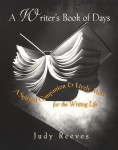 The idea for this blog started when I pulled out the original copy of A Writer’s Book of Days to find a prompt to put on my “Prompt for the Weekend” feature on Facebook, and realized, maybe for the first time, just how many “official” prompts I’ve created. “Official” meaning, I published them somewhere, as opposed to just some that I made up for a workshop or that came spontaneously in a writing practice.
The idea for this blog started when I pulled out the original copy of A Writer’s Book of Days to find a prompt to put on my “Prompt for the Weekend” feature on Facebook, and realized, maybe for the first time, just how many “official” prompts I’ve created. “Official” meaning, I published them somewhere, as opposed to just some that I made up for a workshop or that came spontaneously in a writing practice.
The original A Writer’s Book of Days was published in 1999 and contained a writing prompt for every day, plus another five at the end of each month’s “Beyond Practice” feature. That’s 426 prompts, with a few more thrown in here and there. This book was published after I’d been leading writing practice groups twice (or more) a week for about six years. I’m not counting the prompts from those early days as “official” either, but there had to be several hundred of them.
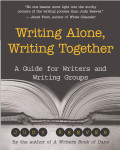 Writing Alone, Writing Together—A Guide for Writers and Writing Groups, published in 2001, featured instructions and suggestions on how to start and run writing groups and contained a chapter on Writing Practice groups. The book contains 54 more “official” prompts along with instructions on how to create effective, evocative prompts—what works and what doesn’t, at least from my experience of, by then, nearly a decade of leading writing practice groups.
Writing Alone, Writing Together—A Guide for Writers and Writing Groups, published in 2001, featured instructions and suggestions on how to start and run writing groups and contained a chapter on Writing Practice groups. The book contains 54 more “official” prompts along with instructions on how to create effective, evocative prompts—what works and what doesn’t, at least from my experience of, by then, nearly a decade of leading writing practice groups.
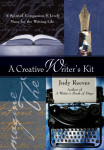 A Creative Writer’s Kit was published in 2003. This cool little kit with an “instruction” book and a 25-card deck offers another 366 writing prompts, one per day for the year. (We always include a prompt for leap year.)
A Creative Writer’s Kit was published in 2003. This cool little kit with an “instruction” book and a 25-card deck offers another 366 writing prompts, one per day for the year. (We always include a prompt for leap year.)
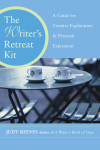 Then came The Writer’s Retreat Kit, in 2005, a beautiful kit about writing retreats and why we need them and how to create them. The kit includes 20 themed retreats. In addition to the 15 or so “exercises,” for each themed retreat, the kit contains additional cards for each retreat, each of which contains 20 prompts. So, another 400 prompts.
Then came The Writer’s Retreat Kit, in 2005, a beautiful kit about writing retreats and why we need them and how to create them. The kit includes 20 themed retreats. In addition to the 15 or so “exercises,” for each themed retreat, the kit contains additional cards for each retreat, each of which contains 20 prompts. So, another 400 prompts.
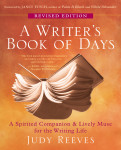 The Revised Edition of A Writer’s Book of Days was released in 2010, with a completely new set of 366 prompts.
The Revised Edition of A Writer’s Book of Days was released in 2010, with a completely new set of 366 prompts.
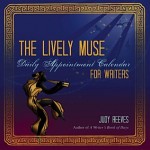 In 2012 I created The Lively Muse Daily Appointment Calendar For Writers. You guessed it: another writing prompt for each day. Except the book was a perpetual calendar, which meant each month had to have five complete weeks so the month could start on any day. Seven prompts x five weeks is 35 prompts each month, x 12 months, equals 420 prompts!
In 2012 I created The Lively Muse Daily Appointment Calendar For Writers. You guessed it: another writing prompt for each day. Except the book was a perpetual calendar, which meant each month had to have five complete weeks so the month could start on any day. Seven prompts x five weeks is 35 prompts each month, x 12 months, equals 420 prompts!
By my reckoning that’s somewhere around 2050+ published writing prompts. A writer might never run out of things to write about. And because this love affair has been going on so long now, I doubt I’ll we’ll ever quit each other, me and writing prompts.
Do you write to prompts? Do you make up your own?
Here’s one, if your pen is watering to get started: Write about an unmade bed. Go for 17 minutes.

Well, I first came across your awesome video “Judy Reeves on Taking Pen in Hand—How to be a Writer Who Writes”, and it was just fabulous; I loved how you approached writing through a very brilliant technique: writing prompts. Now, I’m practising that and it’s working perfectly. Thank you so much Judy 😀
Thanks, Aziz. I’m so glad you’ve found writing prompts are a way into the writing. As I wrote in the post, I’ve been using them, mostly successfully, for many, many years. Even when the writing isn’t my best (or even good), I am still writing and it’s all practice. So pleased you are, too.
Judy, I have used prompts from your book,’A Writer’s Book of Days’ for over a year now. I would not be writing as I do now if I had not been so inspired by your passion. I have long looked for a really intriguing prompt book, ones that probed the imagination, and this is perfect. It has inspired me to make my own prompts as well. Once you start you begin to realize it’s not as hard as you thought it was; you can use almost anything that comes to your mind from random words that strike a chord in your mind or a phrase that sounds like it should be written about or a quote from anywhere. I use your book almost daily, and am constantly thankful for it.
Hi Sarah,
Thank you so much for your comment. I’m delighted the book is serving your writing and even more pleased that you’ve discovered you can create your own prompts. This way you’ll never run out! And the prompts you create will be what you already respond to. My suggestion: write a bunch of them then have them someplace you can draw one spontaneously. That way you won’t begin writing before you actually put pen to page. Thanks again for writing.
Thank you for all your great prompts. Keep throwing them at us. They have really inspired me over the years!
Hi Jill,
and you’ve done some mighty fine writing to those prompts. Thanks for posting a comment. Let’s write together again soon.
Oops that title should be A Writer’s Book of Days.
Yes. All I have to do now is take The Writer’s Book of Days in my hands or just see it on my work bench (some folk refer to it as the dining room table). The mantra calls me to lose myself in play.
Then I decided to write my own of a different vein since I tend to the mysterious and the scary. Aftermaths are particularly unnerving. Crows. Echoes.
Thanks Judy for leading the way.
Thanks, Linda, for doing the writing: crows and echoes and oh my… Always appreciate your comments.